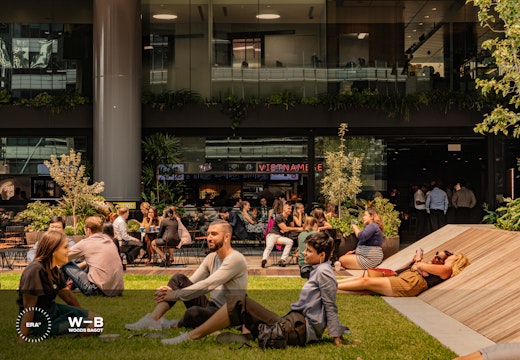While industry is important for the economy of a place, transportation is important in the physical form of the built environment. Cities throughout history have been sized based on transportation technology and the distance that can be travelled by that technology, be it upright on two feet, on an omnibus or streetcar, in a private car, by boat, or on a subway.
The car has been the most influential mode of transportation on 20th century city form. With the advent of the assembly line for private vehicles just a century ago, cars have gone from a travel luxury for the wealthy to a critical mode of transport for billions of people and a key facilitator commerce and goods delivery. Urban environments have followed suit, evolving from intimate communities navigable by walking and public transportation to freeform amoebas sprawling across landscapes traversable via private cars on ten-lane highways.
Similar to the ease of local accessibility provided by cars, air travel has drastically changed global accessibility. Over the past several decades, the relative decrease in the cost of air travel has led to an amazing amount of domestic and international mobility in countries across the world. Air travel allows children who move away from home the relative ease of visiting family, businesspeople to cross several times zones for face-to-face meetings, and people to see parts of the world only imagined by generations in the recent past.
Greenhouse gas emissions from transportation account for 14 per cent of total global emissions by economic sector.[1] While air travel accounts for a small percentage of overall carbon emissions, predictions show that by 2050, it will account for 25 per cent of the carbon budget (the amount of emissions allowed to keep the world within the 1.5 degrees Celsius rise from pre-Industrial Revolution levels.[2] Emissions related to transportation are also contributing factors to population health issues, such as respiratory infections and chronic diseases.
The Covid-19 global pandemic coincides with one of the most critical eras in human history – the era of climate change. The world has been on a trajectory of human-influenced global warming that threatens irreversible changes on ecological systems that support life as humans know it. Now is the time to change human behaviour to reduce the climate crisis.
This unplanned global health crisis shows what happens when immediate changes to industry and travel can measurably reduce particulate matter in the air. The remarkable decrease in emissions we have now seen in China might, over the next several months, show up in the United States.
‘We need to invest in urban systems that support active transportation as well as public transit systems…’
Given that climate change is no longer a far-off threat but happening in real time, it is incumbent upon societies to learn from this pandemic and find ways of maintaining at least some of the temporary reduction in carbon emissions on a longer-term basis. When the immediate threat of Covid-19 infection slows and the global economy begins to pick up, careful thought should be given as to where investments in industry are made in the future and how travel might be changed to keep emissions lower. This will be a critical step to building more resiliency for human ecosystems in the face of climate change.
Politicians, city planners, and policy makers should prioritise and invest in land use policies and urban systems that support walking and active transportation as well as public transit systems in efforts to reduce emissions from vehicles. Governments and companies need to invest in digital masterplans and broadband systems to support remote working and flexible work hours, which supports more diverse ways of living, greater personal autonomy, and reliable access to modern communication systems.
This unexpected global pandemic shows the world it is possible to change behaviour and impact emissions. Now is the time to adapt some of those behaviours into sustainable practices.
In times of crises, paramount is saving human life, but humanity cannot forget other emergencies. Using what can be learned in behavioural changes during this Covid-19 pandemic might be parts of the vaccine that helps save lives in the climate change crisis.










